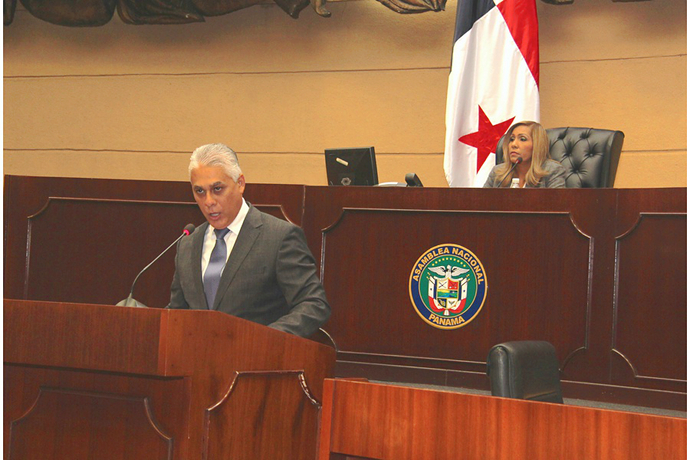Minister of the Presidency Jorge González just got approved by the legislature, as few of Varela’s other appointees have been. Although Varela appointed three new directors at a time when there was one vacancy and two other directors’ terms were about to expire, apparently not designating which person was to fill which spot, most probably González replaces Marco Ameglio, who resigned from the ACP board in the middle of last year to run for president. Last month the terms of Nicolás Corcione and José A. Sosa also expired. Photo by the Asamblea Nacional.
Most PRD legislators ignore party leaders, approve Varela nominee for ACP board
by Eric Jackson
In a way, Jorge González is the stereotypical guy for the Panama Canal Authority (ACP) board of directors. A graduate of the Tecnologico, he spent eight years managing other people’s businesses, mainly in construction and real estate. Those are the industries that dominate PanCanal policy and have for years.
Then González went into his own private business ventures for a decade, while in his activist life he gained stature as a Panameñista stalwart. With the onset of the Varela administration he come on as Secretary of Goals (as in measuring how well or badly the government was doing at meeting them). Then he stepped up as Vice Minister of Housing, presidential spokesman, and up to the top spot in the cabinet, Minister of the Presidency.
In February President Varela nominated three of his administration’s top insiders — González, Vice President and Foreign Minister Isabel de De Saint Malo and Panama’s ambassador to the United States Emanuel González-Revilla — to fill three spots on the ACP board, one to fill a vacancy and two to replace directors whose terms were set to expire in March.
Through the rest of February and all of March the legislature’s Credentials Committee that hears such things sat on these appointments — as they have with most of Varela’s other appointments this year. (The exceptions so far have been the ratifications of Olmedo Arrocha and Abel Zamorano as Supreme Court magistrates.) Credentials Committee president Sergio Gálvez (Cambio Democratico or CD – El Chorrillo) said all along that he would not go out of his way block Varela appointees but that if an appointee had no consensus in support he wouldn’t bring up the nomination for committee consideration.
On March 21 the national executive committee of the Democratic Revolutionary Party (PRD) passed a resolution calling on the party’s 26 legislators to vote against all Varela appointees. On the campaign trail, you mostly hear from CD about what a tyrant Juan Carlos Varela is for jailing his predecessor Ricardo Martinelli. When the PRD is attacked by CD presidential hopeful Rómulo Roux and his colleagues it’s generally cast in terms of how they are Varela’s puppets.
So as March became April Gálvez said that there was a consensus for the committee to take up the González appointment. Despite the pleadings of PRD secretary-general Pedro Miguel González for his party’s members to reject the appointment, in the committee on March 3 one PRD member supported Varela’s man, one abstained and only one voted against. The next day, with a bunch of deputies absent or abstaining, all voting CD deputies joined with the Panameñistas and a few PRD deputies to easily ratify Jorge González for a spot on the ACP board. Only six members of the PRD’s 26- strong caucus voted to reject the appointment.
The minister says that he will join the board at earliest opportunity and also stay on as Minister of the Presidency through the end of Varela’s term (June 30). There have been constitutional issues raised about whether a minister other than Minister of Canal Affairs may serve on the ACP board. If there is such a ban it’s implied rather than forthrightly stated. The debate featured some even more dubious constitutional claims, with PRD leader Pedro Miguel González insisting the ACP autonomy means that a president can’t pack its board with political appointees and Panameñista deputy and mayoral candidate Adolfo “Beby” Valderrama asserting that the legislature has a constitutional duty to approve the president’s nominees.
What might it all say about the state of Panamanian politics? First, all the no-shows and absences just a month away from an election are common enough, with candidates out seeking votes. But only 50 of the 71 deputies are running again and it does appear that many of the rest have given up hope in the face of a large and growing citizen movement to vote out all incumbents.
There may be other explanations, which the public has not heard. The construction and real estate industries’ money and power cuts across party lines. There is the old maxim that if you are going to oppose a politician you need to defeat that person, or be at risk for some payback down the road — so better not vote against the inevitable. Perhaps most of the PRD deputies just like Jorge González. Perhaps he holds some levers of influence about which anyone who knows would rather not say.
Bottom line reality to take away, however, is whichever polls you might believe the PRD’s Nito Cortizo is the presidential front runner, but his party’s discipline has just crumbled.
These links are interactive — click on the boxes












